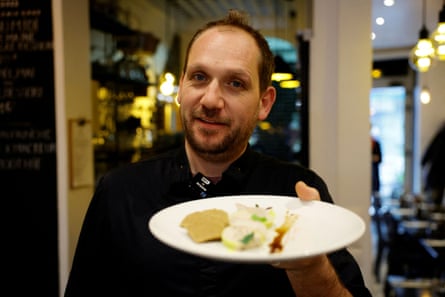
The company laboured over the recipe for more than a year, tweaking it 800 times. After being taste-tested by more than 150 people, the plant-based take on foie gras was deemed ready for market, setting in motion a modest plan to deliver 5,000 units to supermarkets and speciality stores before the holiday season.
Within 12 hours of its launch in mid-December, the units had sold out across Spain. The company scrambled to restock – and watched in awe as another 30,000 units flew off shelves.
“We’re absolutely gobsmacked,” said Javier Fernández, the founder of Madrid-based startup Hello Plant Foods. “Our plan was to start slowly … but we’ve just increased our production sevenfold. It’s crazy.”
Its offering – named Fuah! – is the latest entry into a fledgling market of plant-based alternatives that are taking on a product that has long stirred debate: foie gras.
In Paris, the chef Fabien Borgel launched his vegan take – named faux gras – two years ago, adding to the plethora of recipes that have sprung up online in recent years.
French chef Fabien Borgel displays a dish of ‘Faux-gras’, a vegan alternative to foie gras, as he poses in his restaurant “42 Degres” in Paris, France, December 15, 2022. Photograph: Sarah Meyssonnier/Reuters
The vegan offerings come as the animal product has routinely found itself in the headlines. King Charles reportedly told animal rights campaigners in November that foie gras would not be served in royal residences, while the US state of California as well as New York City have both sought to ban the product.
It was against this backdrop that Fernández and his team began fashioning their take on foie out of cashews, coconut oil and beetroot extract. The aim was to produce a hyperrealistic plant-based version, said Fernández, one aimed at vegans and vegetarians but also meat-eaters.
“There’s a hidden consumer that loves foie. But what happens is that a photo of the ducks with the tubes sticking out of them flashes before them and they don’t want it,” he said. “When they try Fuah! their eyebrows shoot up and they go: ‘Madre Mia.’”
While the production of foie gras – the liver of a duck or goose fattened by force-feeding – has long been condemned by animal rights campaigners as “cruel and torturous”, producers have argued that when done properly, the animals do not suffer.
Since Fernández launched the product, inquiries have poured in from across Europe and the US, catching the company off guard. “We weren’t expecting any of this. We hadn’t really done any advertising,” he said.
As word of the product spreads, so have questions as to whether a plant-based product that seeks to mimic the look, texture and taste of foie gras is the right way forward. “Sometimes people tell us: ‘You vegans are so tiresome, you always want to imitate animal products. Why do you have to describe lettuce as fillets?’” said the 45-year-old.
“What they don’t understand is that the only way that change happens is when the product is excellent and very similar to what people are going to give up. We’ve solved that.”



